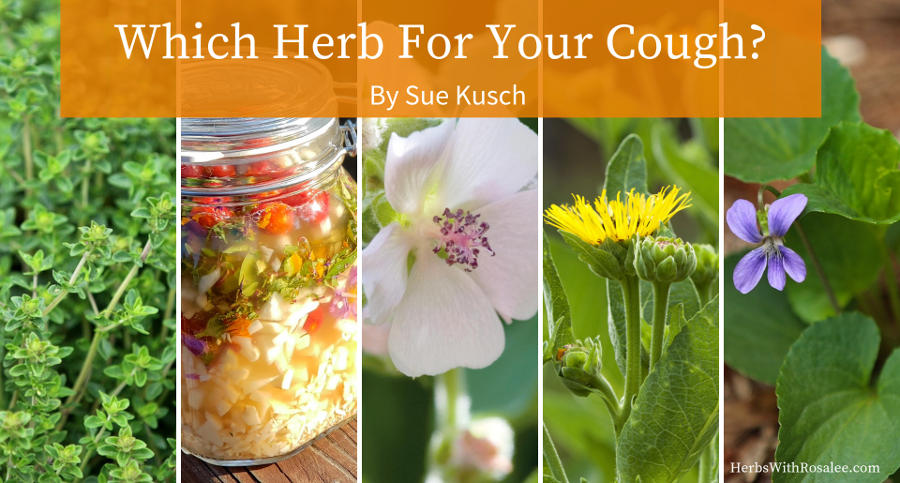Get weekly tips, recipes, and my Herbal Jumpstart e-course! Sign up for free today.

Natural Remedy for Cough
Share this! |
|
It’s an interesting experience to be an herbalist at a public meeting in the winter. The crowd settled into their seats and sat quietly as the speaker prepared her notes. And then the coughing began. The coughs varied in sound based on congestion, and I found myself mentally assigning herbs for each type of cough! A couple of the coughers left when they could not stop, and the scent of menthol-flavored over-the-counter (OTC) cough drops permeated the room.
We all know how miserable an upper respiratory infection can be but most people seem to suffer through it using OTC medicine, which suppresses the natural actions your body performs to heal itself. In fact, suppressing the coughs associated with infection can actually delay recovery. All that junk in your lungs is supposed to be expelled.
Coughing is an immune response designed to expel the congestion or irritants in your lungs. But it can take weeks for the lungs to clear up, especially if we don’t rest, don’t stay hydrated, and use OTC drugs to keep us working.
Coughing is the most annoying symptom of an upper respiratory infection, not only for the people who are coughing but for those who have to live and work with them. Sleeping beside someone who is coughing all night means that both of you will be exhausted in the morning.
Herbs can really shine when it comes to the cold and flu season because they can assist your body’s natural responses to expel the infection while also providing some relief from the discomfort. The key is matching the herb’s energetic properties to the type of cough. So, the first step is to determine the types of cough you have.
Natural Remedy for Cough: Productive Cough
A productive cough is one that produces phlegm, which is a thickened mucus that’s produced by the respiratory membranes, and is sometimes called a wet cough. Your chest feels full, may make rattle-type noises and, if too congested (thick), will cause coughing spasms. I like to think of those annoying spasms as a message from the body saying, “Hey, I could use a little help here!”
Herbs that can energize the lungs and expel the mucus are called stimulating expectorants. Spicy herbs produce this effect and one of the easiest remedies to start with is a hot ginger tea made with dried ginger and a touch of cayenne.
Fire cider, with its pungent combination of horseradish, onion, and garlic steeped in vinegar, can be both effective for stimulating congestion and supportive of the immune system.
With a little bit of planning, an expectorant herbal cough syrup can be made using elecampane or hyssop. Steeping these herbs in honey for several weeks and then taking teaspoons frequently will help with coughing and can soothe an inflamed throat.
Less enjoyable than drinking herbal tea for cough or licking honey off a spoon, the traditional folk remedy of a mustard pack (a poultice of mustard seed applied to the chest region) is effective at breaking up congestion in the lungs and expelling the mucus.
Natural Remedy for Cough: Unproductive Cough
A non-productive cough does not bring up phlegm, and we often refer to it as a dry cough. When not treated, unproductive coughs can produce spasms of coughing that can actually create muscular soreness.
Dry coughs can go on for weeks, especially if using an OTC cough suppressant. These coughs can keep you awake all night and sleeping is an important part of your healing process. Your chest feels “tight” and there may be a wheezing sound in between coughs. Some people may experience a tickle or irritation in their throats. The problem is stuck congestion that is too thick and dry to expectorate but your lungs are trying to do their job anyways. Again, another message from your body asking for a bit of help!
Drinking teas made with demulcent herbs like marshmallow root, violet and linden will help to moisten and soothe the passageways, easing irritation and dryness.
Taken before bedtime, antispasmodic and sedative herbs like valerian and California poppy can help relax muscles and, yes, suppress the cough response. Your body needs rest to heal itself so suppressing unrelenting cough spasms that keep you awake at night is an appropriate strategy for recovery. Other antispasmodic herbs like mullein leaves and cramp bark are more suitable during the day when you need to stay awake.
Simple Natural Remedy for Cough
But what if you are sick now and don’t have any of the herbs mentioned in this article?
Look to your kitchen for two simple remedies: thyme and honey. Drink a strong tea of thyme (admittedly, an acquired taste), which has a long history of use for upper respiratory complaints. Then cover up the thyme taste with a teaspoon of honey, which helps with both coughing and sore throat. Repeat every hour or two.
There are several key benefits of using herbal remedies for coughs: first, you are supporting your body’s natural ability to heal itself rather than fighting it through drug-induced suppression. Second, herbs are truly 100% natural, unlike the OTC products that are made with synthetic chemicals, alcohol, artificial food dyes, and low levels of mind-altering drugs. Learning to make simple herbal remedies for coughs will also save you money and puts you in charge of your health and wellness.

Sue Kusch, a former community college instructor and academic advisor, incorporates her experiential wisdom, expertise and science-based research garnered from her three decades of growing vegetables, fruit and herbs into her educational writing about plants and how people use them. In addition to her BA in Social Sciences and Masters in Education, she completed the Master Gardener training in 2011 and two permaculture courses in 2001 and 2014. She has studied medicinal and nutritional uses of herbs, including studies at Herbmentor and East West School of Planetary Herbology, since 1997. An avid reader, lover of historical and folkloric information, and a promising storyteller, Sue writes about the intersection of plants and people.
